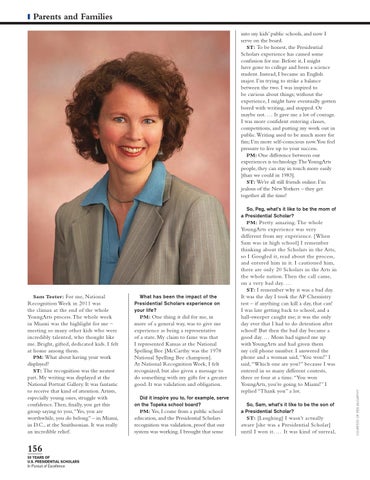I Parents and Families into my kids’ public schools, and now I serve on the board. ST: To be honest, the Presidential Scholars experience has caused some confusion for me. Before it, I might have gone to college and been a science student. Instead, I became an English major. I’m trying to strike a balance between the two. I was inspired to be curious about things; without the experience, I might have eventually gotten bored with writing, and stopped. Or maybe not. … It gave me a lot of courage. I was more confident entering classes, competitions, and putting my work out in public. Writing used to be much more for fun; I’m more self-conscious now.You feel pressure to live up to your success. PM: One difference between our experiences is technology. The YoungArts people, they can stay in touch more easily [than we could in 1983]. ST: We’re all still friends online. I’m jealous of the New Yorkers – they get together all the time!
Sam Teeter: For me, National Recognition Week in 2011 was the climax at the end of the whole YoungArts process. The whole week in Miami was the highlight for me – meeting so many other kids who were incredibly talented, who thought like me. Bright, gifted, dedicated kids. I felt at home among them. PM: What about having your work displayed? ST: The recognition was the neatest part. My writing was displayed at the National Portrait Gallery. It was fantastic to receive that kind of attention. Artists, especially young ones, struggle with confidence. Then, finally, you get this group saying to you, “Yes, you are worthwhile, you do belong” – in Miami, in D.C., at the Smithsonian. It was really an incredible relief.
156 50 YEARS OF U.S. PRESIDENTIAL SCHOLARS
In Pursuit of Excellence
What has been the impact of the Presidential Scholars experience on your life?
PM: One thing it did for me, in more of a general way, was to give me experience as being a representative of a state. My claim to fame was that I represented Kansas at the National Spelling Bee [McCarthy was the 1978 National Spelling Bee champion]. At National Recognition Week, I felt recognized, but also given a message to do something with my gifts for a greater good. It was validation and obligation. Did it inspire you to, for example, serve on the Topeka school board?
PM: Yes, I come from a public school education, and the Presidential Scholars recognition was validation, proof that our system was working. I brought that sense
PM: Pretty amazing. The whole YoungArts experience was very different from my experience. [When Sam was in high school] I remember thinking about the Scholars in the Arts, so I Googled it, read about the process, and entered him in it. I cautioned him, there are only 20 Scholars in the Arts in the whole nation. Then the call came, on a very bad day. … ST: I remember why it was a bad day. It was the day I took the AP Chemistry test – if anything can kill a day, that can! I was late getting back to school, and a hall-sweeper caught me; it was the only day ever that I had to do detention after school! But then the bad day became a good day. … Mom had signed me up with YoungArts and had given them my cell phone number. I answered the phone and a woman said, “You won!” I said, “Which one are you?” because I was entered in so many different contests, three or four at a time. “You won YoungArts, you’re going to Miami!” I replied “Thank you” a lot. So, Sam, what’s it like to be the son of a Presidential Scholar?
ST: [Laughing] I wasn’t actually aware [she was a Presidential Scholar] until I won it. … It was kind of surreal,
COURTESY OF PEG McCARTHY
So, Peg, what’s it like to be the mom of a Presidential Scholar?
